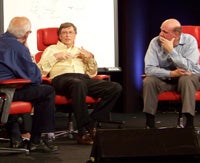CARLSBAD, Calif. — It wasn’t exactly a formal handoff of power but when Bill Gates and Steve Ballmer shared a stage last night, the symbolic transition played out as Gates gets ready to retire from his full time job at the world’s largest software company.
The two appeared at The Wall Street Journal’s “All Things Digital Conference,” where co-hosts Walter Mossberg and Kara Swisher interviewed them on stage.
 |
Gates and Ballmer speak with WSJ’s Mossberg at the “All Things Digital” conference. Photo: Larry Magid |
Earlier in the evening I had an opportunity to talk with Gates about his fondest memories at Microsoft. “We got to dream about a software industry and the greatest tool of empowerment ever, the personal computer and be part of creating that in terms of the platform and the applications,” he said.
I asked him about high points in his Microsoft memories. “Windows 95 was a nice milestone.” He also spoke highly of Microsoft Sharepoint server software but didn’t mention Vista. As for the future, “the day that the tablet (PC) is mainstream, that will be a fun day.”
The event had attendees like myself putting the history in context. Although Gates is expected to step away from his day-to-day responsibilities soon, he will remain as Chairman of the Board and Microsoft’s largest stockholder. Ballmer will continue as CEO, a title he has held for the past eight years.
Gates and Ballmer were buddies at Harvard until Gates dropped out to form Microsoft. Ballmer graduated and went on to Stanford business school. Gates later recruited him in 1980 while Ballmer was living in what he described as a “flea-ridden room in Palo Alto (Calif) for $100 a month.”
Shortly after Ballmer joined the company he told Gates that he wanted to add 18 employees to the payroll. Gates, ever mindful of the bottom line, objected. “I didn’t ask you to leave business school to bankrupt the company,” Gates recalled.
The push-and-pull partnership went on to build one of the most successful companies of all time.
“Income always stayed ahead of hiring,” said Gates “I never had to say to Steve you have to stop.” Gates added, “we are one of the few companies to this day that keeps enough cash on hand to pay payroll if we didn’t get paid for a year.”
Ballmer added: “We take all our risks technologically; why take a lick of financial risk?”
Then came the Vista operating system question. Mossberg asked them if Vista, which critics have hit for being too hard on resources, was a failure or a mistake. Ballmer countered that it’s neither. “With 20/20 hindsight, are there things we would do differently,” he added.
Ballmer said Vista has sold 150 million units so far. On the other hand, he did say that business customers could request a “downgrade” to Windows XP after the company stops selling XP in June.
After sharing some memories, the two turned to the future, such Vista’s successor, called Windows 7.0. Rather than just talk about the upcoming operating system, which is expected late in 2009, the event brought out Microsoft Vice President Julie Larson-Green, who demonstrated the Windows 7.0 multi-touch interface instead of the traditional mouse approach.
She used two figures to paint a stick figure and moved other objects around the screen with a touch of a finger. But for the most part, it reminded the audience of how millions of people already interact with their iPhone.
Ballmer would later tell me that Windows 7.0 features plenty of other impressive innovations. So why choose to show something that reminds everyone of Apple? He reminded me that Microsoft had shown off a similar interface more than a year ago when it demonstrate its table top PC. Still, most people at the conference I spoke with agreed that the Windows 7.0 demonstration was underwhelming.
Gates and Ballmer also touched on the Yahoo acquisition, or lack of one. Ballmer said that Microsoft has not made a follow up bid to acquire Yahoo, though he “reserves the right to do so.” He said that he had hoped to acquire Yahoo to “accelerate our online and advertising strategy. But we were going to be financially disciplined [with our approach]. We walked away.”
At this stage, Yahoo and Microsoft are still talking about other possibilities, likely some type of advertising business relationship.
Although much of the evening focused on technology and business, what really came across was a relationship that led to Microsoft.
“The key thing was doing it together, two heads working on something,” said Gates. He may be stepping down from the day-to-day, but he won’t be far from the fray.
Courtesy of Larry Magid. All rights reserved.


